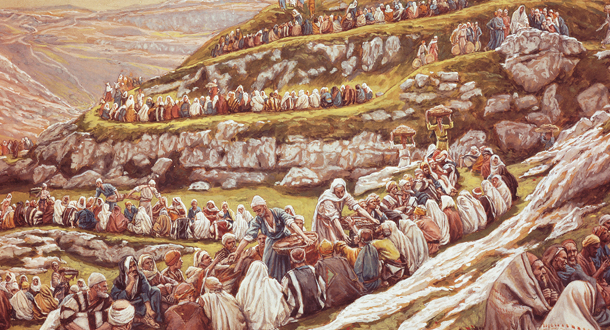
Scripture:
Jeremiah 28:1-17
Matthew 14:13-21
Reflection:
No one could accuse the prophet Jeremiah of being too cheerful! This melancholy prophet lived in very difficult times, as Israel was on the brink of invasion by the Babylonians, a threatening world power of the time. As we have been hearing the past several days in the liturgy’s daily readings, Jeremiah’s blunt message, warning Israel to repent and prepare itself for what was about to happen, earned him scorn and violent repression by his contemporaries. In today’s reading (Jeremiah 28:1-17) we hear more of the same. Hananiah, a self-proclaimed prophet, tells the people what they want to hear—God will “break the yoke of the king of Babylon” and everything will be well. They had nothing to fear and no reason to change their ways. But Jeremiah was a truth teller and he exposes Hananiah as a false prophet, feeding the people lies.
In this political season we hear a lot of claims how we can solve the world’s problems—the violence, the economic inequity, the fate of so many refugees and immigrants. In the spirit of Jeremiah, we should be wary of those who give us easy answers without requiring any change of heart on our part, without any sacrifices or transformation of our habits. Pope Francis has reminded us over and over that to achieve true peace and security we need to change our ways and learn to share our resources with other and adapt a different way of looking at our responsibility toward God’s creation and God’s people—to resist what the Pope calls a “culture of indifference.”
In contrast with the false hopes fed to the people by someone like Hananiah and some contemporary hollow voices, we hear in the gospel passage today the account of Jesus’ feeding of the multitudes (Mt 14:13-21), a vivid story that is found in all four gospels. The disciples want to send the crowds away and not bother with them. But Jesus, God’s Son, gives true, nourishing food to those who hunger—that is the fundamental message of this miracle of the loaves and fishes. The way the story is told—taking place in a “wilderness setting” and the manner of Jesus’ words of blessing over the food evoking the Last Supper—recalls for the reader the past story of God’s feeding the people with manna in the desert and anticipates the future reality of Eucharists still to come. Jesus here teaches his disciples about their own mission: to feed with real food people who are hungry, to reach out to the needs of others and not send them away with indifference, to entrust our lives to God’s loving providence and to live in hope.
Fr. Donald Senior, C.P. is President Emeritus and Professor of New Testament at Catholic Theological Union. He lives at the Passionist residence in the Hyde Park neighborhood of Chicago.
